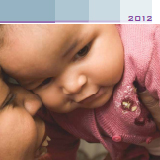
This report reviews the progress made towards implementing the commitments to advance the Global Strategy for Women’s and Children’s Health, launched by the United Nations Secretary-General Ban Ki-moon in September 2010. A key aim of the Global Strategy is to save 16 million lives in the world’s 49 poorest countries by 2015 through enhanced financing, strengthened policy and improved service delivery. The Global Strategy identified six key areas in need of urgent action to improve women’s and children’s health:
- Support for country-led health plans, underpinned by increased, predictable and sustainable investment;
- Integrated delivery of health services and life- saving interventions to enhance access;
- Stronger health systems, with sufficient skilled health workers at their core;
- Innovative approaches to financing, product development and the efficient delivery of health services;
- Improved monitoring and evaluation to ensure all actors are accountable for results;
Promoting human rights, equity and gender empowerment.
To take forward accountability for achieving the Global Strategy, the Commission on Information and Accountability (COIA) was created to make recommendations on global reporting, oversight and accountability mechanisms for women’s and children’s health. Subsequently, an independent Expert Review Group (iERG) was set up in 2011 to report annually to the United Nations Secretary- General on the results and resources related to the Global Strategy, and on progress towards implementing the COIA recommendations.
This report was produced by the Partnership for Maternal, Newborn & Child Health (PMNCH) in response to a request from the iERG to inform its reporting to the United Nations Secretary-General. It reviews progress on implementation of commitments to the Global Strategy made by 220 stakeholders1 from seven constituency groups: implementing countries; bilateral donors and foundations; civil society organizations (CSOs); multilateral agencies; private sector; health-care professional associations; and academic and research institutions. The report identifies catalysts and constraints to the delivery of commitments and provides examples of good practices and challenges to accountability for women’s and children’s health.
Building on the 2011 PMNCH Report on commitments,2 the report also analyses the scope and content of new commitments. Finally, it provides recommendations on the way forward.